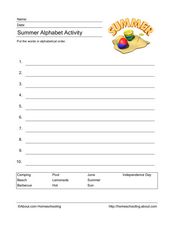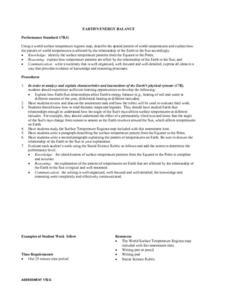Curated OER
Length of the Day & the Seasons
Students answer questions for each of the graphs and record their answers on the Student Observation Sheet. They use the data they have collected, hypothesize which graph represents which month of the year using each graph. They then...
Curated OER
ASL: Lesson 14
Build your sign language vocabulary with this ASL lesson. Link to videos that show how to sign properly. Intended for those teaching or learning ASL as a mode of communication.
Space Awareness
The Intertropical Convergence Zone
Young scientists know it is hotter along the equator, but why is it also rainier? Through the process of completing two experiments and a worksheet, scholars discover the answer is the intertropical convergence zone. First, they...
Curated OER
Birds and Coffee
Fifth graders identify the changing seasons with how they affect animal and human behavior. They explain what migration is and why many birds migrate south for the winter. They then trace the coffee sold in their neighborhood and in...
Curated OER
Adjectives and Adverbs
Adjectives and Adverbs are the focus of this Standardized Test-type of worksheet. Learners consider ten sentences, and make changes, if necessary, to the underlined portions of each sentence. This worksheet would provide excellent...
Illustrative Mathematics
How is the Weather?
This activity asks learners to interpret data displayed on a graph within the context of the problem. Students are given three graphs that show solar radiation, or intensity of the sun, as a function of time. They are also given three...
Curated OER
Heavens Above
Students study the stars and their positions. In this astronomy lesson students see how scientists can predict the positions of the stars and can tell how they would have appeared in the past.
Curated OER
Shadows
Students measure shadows at different times of the day to determine when a shadow casts its longest and shortest shadows.
Curated OER
Astronomy
Students complete a unit of lessons on our solar system, its stars, and astronomers. They record information in a space journal, design constellations, define key vocabulary, observe the phases of the moon, and create a group planet...
Curated OER
Knowing North: Understanding the Relationship Between Time and The Sun
Young scholars determine how to find North using a watch and their shadow. In this finding North activity, students go outside on a sunny day and work with their shadow and a wrist watch to find out which direction that North is. They...
Curated OER
Celebrate The Four Seasons
Students investigate cause and effect and compare and contrast how recurring cycles are evident in multiple aspects of their education. They answer questions in the chosen field. Students model each aspect by interpreting, perceiving and...
North Carolina Museum of Natural Sciences
Weather Watch Activity Guide: Groundhog Day
Exactly what do groundhogs know about weather? Not as much as your science students will after completing these lessons and activities that cover everything from the earth's rotation and the creation of shadows, to cloud...
Can Teach
Groundhog Day Songs and Poems
This Groundhog Day add a bit of rhythm and rhyme with 23 songs and poems that put a spotlight on the holiday's shining star, the groundhog.
Curated OER
Summer Challenge
In this summer challenge learning exercise, student choose the correct answer from the four choices they are given in 9 examples. They choose from ideas and items related to summer in each one.
Curated OER
Mother Nature Has Her Say
Students use their creative writing skills to develop interview questions for Mother Nature. Using writing, they respond to the questions another student developed and use the internet to research any topic they need more information on....
Curated OER
Summer Vocabulary
In this summer vocabulary worksheet, students read 10 definitions that pertain to summer. Students match these definitions with the words they describe.
Curated OER
Your Day as a Cycle
Fourth graders examine a variety of cycles. They take a look at life cycles of plants and animals, the cycle of the moon and tides, and other sequences of events in their daily lives. An interesting part of the instructional activity is...
Curated OER
Summer Alphabet Activity
In this summer activity worksheet, students examine 10 summer-related terms and then put those terms into alphabetical order.
Curated OER
Earth's Energy Balance Performance Standard
Young scholars examine how Earth-Sun relationships affect Earth's energy balance and the pattern of world temperatures. Students study a Surface Temperature Regions map and write a paragraph describing the temperature pattern from the...
Curated OER
Are You Sure it is not the Distance?
Students examine how the changing distance between the Earth and the sun causes the seasons. They watch a Science Court video, and answer discussion questions using Science Court Seasons software.
Curated OER
Learning Lesson: The Shadow Knows I
Students examine the elevation of the sun to discover the changes in seasons. They observe and measure the length of their shadow. They compare this measurement to one taken four months later.
Curated OER
How Does Earth Move?
In this earth movement worksheet, students will fill in the blank of 4 statements relating to how the Earth spins on its axis and how it moves around the sun.
Curated OER
The Earth in Space
High schoolers use computer images to explain why the Earth has seasons and examine the phases of the moon. They create 3-D images and present them to the class. They answer a series of questions at the end of the lesson.
Curated OER
Summer Bummers
Brainstorm popular summer activities and their risks after having your class read an article. They will discover the risks of sun overexposure and in groups develop public service announcements for young people. They also propose a media...

























